Photographs: Reuters Praveen Bose in Bengaluru
Nandan Nilekani and his wife Rohini donated Rs 50 crore to the Indian Institute for Human Settlements, which plans to transform hordes into urban practitioners and may save our cities by doing so.
If the renowned -- and often reviled -- English economist-philosopher Thomas Robert Malthus were to step into any Indian city today, it is quite probable that a faint smile, perhaps even a grin, would manifest itself on his face.
Stretching before him would be an urban chaos, teeming with slums and impregnable traffic. He would pass migrant workers -- many of them women who build roads and houses for privileged Indians -- splayed out on sidewalks they call home, cooking their evening meal and playing with their undernourished children.
He would wrinkle his nose while passing innumerable open and overflowing sewers and gingerly hop around mounds of garbage being scoured by placid cows. He would probably still wear that smile.
. . .
Why the Nilekanis donated Rs 50 crore to IIHS
Photographs: Rediff Archive
Malthus, who was a member of the East India Company and influenced British rule in India, would congratulate himself on getting it right hundreds of years ago when he postulated that the human lot is incapable of improving itself, that God invented poverty and starvation so that we could learn lessons about hard toil and virtuous behaviour and that ultimately 'sickly seasons, epidemics, pestilence, and plague ' are the only corrective forces we can rely on to bring balance to our cities.
Frederich Engels, co-author of the Communist Manifesto, called it "...the crudest, most barbarous theory that ever existed." Yet, Malthus, despite his cold rationale, may just be right.
Indian cities are a disaster. For instance, while our urban population is rising rapidly by about 30 million people every year, adding to the 350 million already living there, our cities tend to be exclusionary and hostile to the very people that aid their growth -- migrants -- who often live in abject misery without plumbing or sanitation, and under the many overhangs of flyovers that dot our urban terrain.
. . .
Why the Nilekanis donated Rs 50 crore to IIHS
The newly minted, Indian Institute of Human Settlements (IIHS) -- located in Kengeri on the outskirts of Bengaluru -- aims to change all of that and, by doing so, prove Malthus wrong.
As more and more people make that journey from villages to tier-2 towns or major cities, there is an urgent need to train people to manage this humongous social transformation and to fill the human resource and knowledge gap that will arise very soon.
Which is why a group of eminent personalities from the research, professional and corporate arenas amongst others, put their heads together to try and figure out how to solve India's intractable urban planning problem and came up with the IIHS.
. . .
Why the Nilekanis donated Rs 50 crore to IIHS
Photographs: Reuters
The board of directors has some serious industry star power and includes Xerxes Desai, Jamshyd Godrej, Cyrus Guzder, Renana Jhabvala, Vijay Kelkar, Keshub Mahindra, Kishore Mariwala, Rahul Mehrotra, Rakesh Mohan, Nasser Munjee, Deepak Parekh, Shirish Patel, Aromar Revi, Deepak Satwalekar and UIDAI chief Nandan Nilekani.
"We conceived IIHS as an inter-disciplinary university born out of the realisation that only inter-disciplinary academics within a university would be able to offer the breadth and depth, and practice urgently required to solve the multi-dimensional urbanisation challenges that confront the country today," said Aromar Revi, director, IIHS.
The scale and ambition of IIHS's educational mission is breathtaking -- to build from ground-up, an establishment that one can refer to in the same breath as the Indian Institute of Sciences or Shantiniketan while educating a staggering 50-100,000 students.
. . .
Why the Nilekanis donated Rs 50 crore to IIHS
Photographs: Reuters
This isn't a place that will churn out urban planners or architects, but instead aims on generating an army of practitioners that has imbibed lessons from these as well as other fields, such as politics, history, law, governance, politics and management.
The aim, Revi says, is to learn how to answer questions that 'why?' and not just 'how?'
Training people in this manner may just save the Indian city of tomorrow. Jeb Brugman, author of Welcome to the Urban Revolution -- How Cities are Changing the World, feels that a revolution is sorely needed in Indian urban planning, which has always glorified alien forms -- Le Corbuisier's Chandigarh, for instance, should have incorporated small Dhaba-like social spaces on its streets -- while ingenious indigenous forms, like the 'Chowk', are considered out of fashion and ignored.
. . .
Why the Nilekanis donated Rs 50 crore to IIHS
Photographs: Reuters
Similarly, instead of embracing Dharavi as a legitimate part of Mumbai's vibrant economic and cultural life, much like Brazil has done with its favelas, the plan is to raze it to the ground, build a commercial district in its place and shunt its population elsewhere.
This is a surefire recipe for social upheaval says Brugman, in his book.
An important mission of the IIHS is to try and attract a large number of students from small towns and villages and not just the urban elite who have a tendency to dominate these kinds of places.
. . .
Why the Nilekanis donated Rs 50 crore to IIHS
Photographs: Reuters
The IIHS will offer: "globally-benchmarked bachelors, masters and doctoral degrees in urban practice based on a wide set of disciplines and practice areas central to India's urban transformation," added Revi.
IIHS will offer never-before heard degrees in India, like the BUP (Bachelors in Urban Planning), which will be a four-year course after plus-2. Meanwhile, the MUP or Masters in Urban Planning will be a two-year programme.
The IIHS has also tied-up with several well-known foreign institutions, including the Massachusetts Institute of Technology, University College London, and The African Centre for Cities of the University of Cape Town, Revi said.
. . .
Why the Nilekanis donated Rs 50 crore to IIHS
Photographs: Courtesy, Infosys
The tentative fee structure for the MUP could be in the range of Rs 300,000 to Rs 400,000 per annum. "The IIHS is planning to offer about 50 per cent of its students scholarships and financial assistance of varying degrees depending on their needs," said Aromar Revi, an alumnus of IIT-Delhi and the law and management schools of Delhi University.
Nandan Nilekani, and his wife Rohini Nilekani have donated Rs 50 crore (Rs 500 million) to the IIHS. Nilekanis, when making this donation recently, said: "The donation was made as the IIHS is at the convergence of both our interests in education, urbanisation and sustainability."
On the gift by the Nilekanis, Revi said :"This is in keeping with their vision of building quality transformative institutions for India and a reinforcement of their past philanthropic commitments. Nandan Nilekani has been deeply involved with the IIHS from its conceptualisation".
. . .
Why the Nilekanis donated Rs 50 crore to IIHS
Photographs: Reuters
The IIHS said the donation marked 'a major step' in its endeavour to mobilise Rs 300 crore (Rs 3 billion) to fund five interdisciplinary schools, build one of South Asia's largest reference and digital libraries and establish other facilities on its campus near Kengeri.
The IIHS is also raising Rs 100 crore (Rs 1 billion) for chair professorships at the university.
Revi was confident that students passing out of this institute will have job opportunities since the "most serious constraint facing Indian cities today is not capital but the availability of suitably educated professionals, entrepreneurs and change makers who can act in the common good".
. . .
Why the Nilekanis donated Rs 50 crore to IIHS
Photographs: Reuters
"We see career opportunities across the public and private sectors as well as civil society and universities and knowledge enterprises" says Xerxes Desai, founder head of Titan Industries.
"We have started a dialogue with future employers including developers, financial sector, NGOs and the government and the private sector to develop a market for these graduates," adds Desai.
With IIHS's new flock of well-trained cadres, India has a chance to dream about an inclusive, well-planned and sustainable urban future while staving off the kind of social calamities and criminality that inevitably accompany inequitable, non-inclusive high growth trajectories.
Somewhere up there, Malthus is frowning.


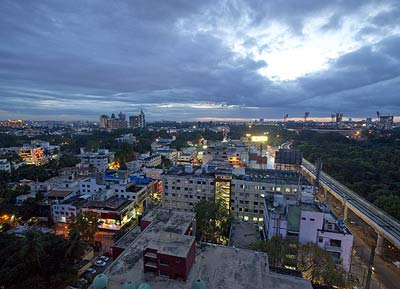

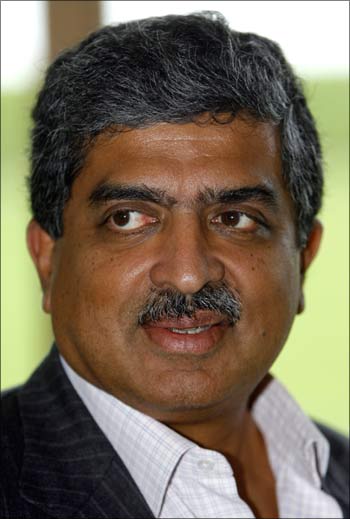
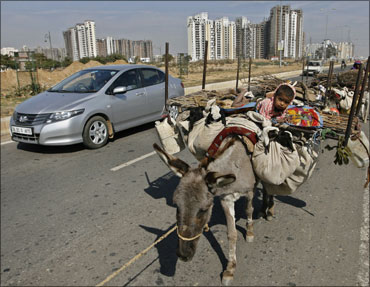
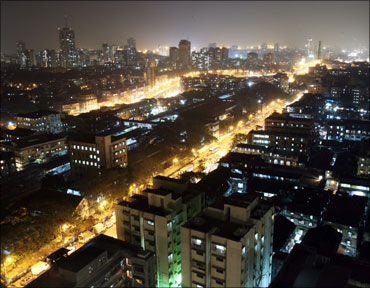
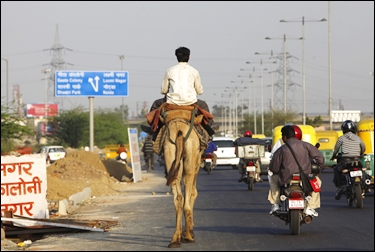
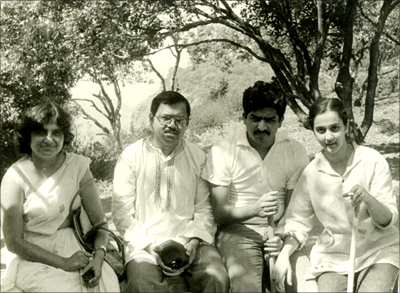



article